At the Big Brothers Big Sisters of Metro Atlanta, Michael Gandy, now 28, draws from personal experience as a young black teen. He talks to his mentor and “big brother” Austin Scee, 44, about police, mentorship and the community’s responsibility in the nationwide conversation concerning youth and law enforcement.
Scee: So, Mike, I thought given everything that’s been going on in our country, now might be a good time to revisit something that happened to you and to me in 2008 when you drove up to our house. [My wife] and I met you at the end of the driveway. You were driving your mother’s car, which was a beat-up old car with, I think, fairly heavily tinted windows. You had a police car trailing you as you drove up our street. You made an illegal U-turn in a four-way stop to park in front of our house —
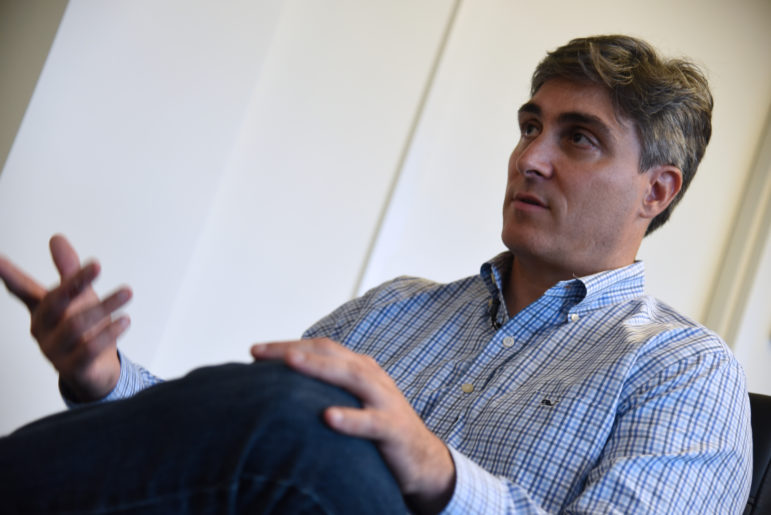
Gandy: Not the best idea —
Scee: Not the best idea with a police car trailing you. I immediately noticed that the police car turned around aggressively, and [the officer turned his sirens on]. [The officer] got out of the car and starting walking toward your door. He looked serious, not like it was a routine traffic stop to me, so I said to him: “That's my brother. Officer, that's my brother.”
I could tell that he really couldn’t hear the words that I said ... It was clear to me the officer was nervous, and he had his hand in place on his gun as he approached your window. And all I could do was stand there with [my wife] and keep her calm and hope that you would be calm and manage your way through the situation.
From our perspective, we sat there watching: I could empathize with the police officer and all of the things that might be going through his head. I could empathize with you in terms of what might be going through your head. Although I’ve come to learn from you later that some of the things I imagined might be going through your head weren’t. You were just worried about getting a ticket.
That was a pretty meaningful experience for me ... Now with eight years having passed and the context we’re currently in, how do you reflect on it?
Gandy: Looking back I think context is really important. This was 2008, four years before this really was a fire across the country. Trayvon Martin was [killed in] 2012, and there have been several [other shootings] in the past couple of weeks and years.
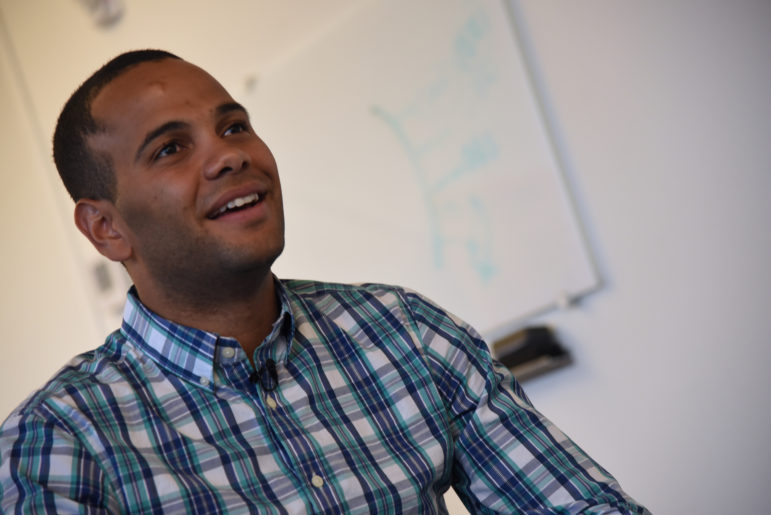
For me, I was an athlete; I played football and basketball. I was mostly in the car with my mom or traveling with you somewhere. Honestly, I didn’t interact with police at all growing up ... I was intimidated. I would always double-check and make sure I had my seatbelt on. I’d always be doing the right thing, but I’d become nervous. They were, to me, seen as an authority. They were police. They were the law: people I should respect and follow.
So when I was pulled over, it wasn’t a sense of terror — I was anxious more than anything. I wasn’t sure quite what to do; I guess I knew why I was being pulled over. I remember trying to get out of the car and being yelled to not open the door. I really didn't understand that. I was parked in front of your house. I had the right to be there.
I remember just partly being confused of what happened and just unprepared for that. We never talked about race; it was not a big issue for us … I was never in a situation prior to that where race was a factor, so I was really torn on if I did something wrong, if I really deserved that kind of treatment or if it really was fair for him to react in the manner that he did …
For more examples of Racial-Ethnic Fairness, go to JJIE Resource Hub | Racial-Ethnic Fairness » Resources
I think if [the shootings] of the past couple of years had happened before this incident, I would have reacted much differently. I think I would have been more aware, prepared and probably would have been more angry … just bothered by the scenario, which could have escalated ...
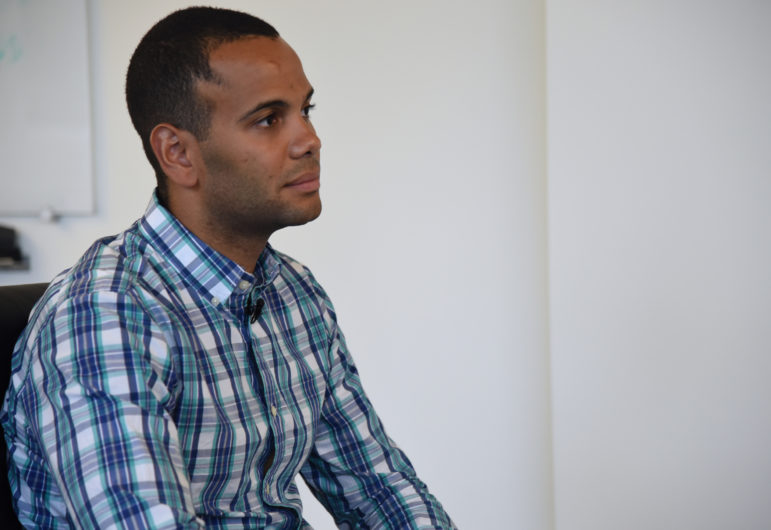
Scee: Yeah, I was just going to say if you had reacted in that [agitated] way, how might the situation have played out differently? You behaved the way I think I would have behaved when I was your age: I can’t afford a ticket; I don’t want points on my license. It was sort of a feeling of panic that you’ve broken a rule [as opposed to thinking]: ‘I might be in danger.’ If you had that type of reaction how might that have changed the situation for the worse?
Gandy: That’s a question I think about almost nightly or weekly whenever I’m lying in my bed: If I get pulled over today, am I going to react calmly? Am I going justify who I am, my education, my background? ... I have the right to look the way I look and act the way I act. I think it’s certainly not fair to be profiled like that, but it’s really tough knowing that this isn’t a fair place we live in, and people do have biases that they carry with them …
Scee: I can imagine how [my wife] would react if she were in the same exact position ... She would put herself in a lot of danger because she’s a 100-pound woman, she’s white ... She doesn’t put herself in any danger, but if she is challenged in these ways, she’s allowed to react. If I'm challenged in those ways, for the most part, I think I'm allowed to react [with frustration]. I find myself sometimes in random situations where somebody does challenge me in that way. I have to hold back the urge and the temptation to lash out and say, ‘That’s not fair.’ The repercussions for me to react that way if I weren't able to keep my cool are actually very minimal. For you they might be a lot [more serious].
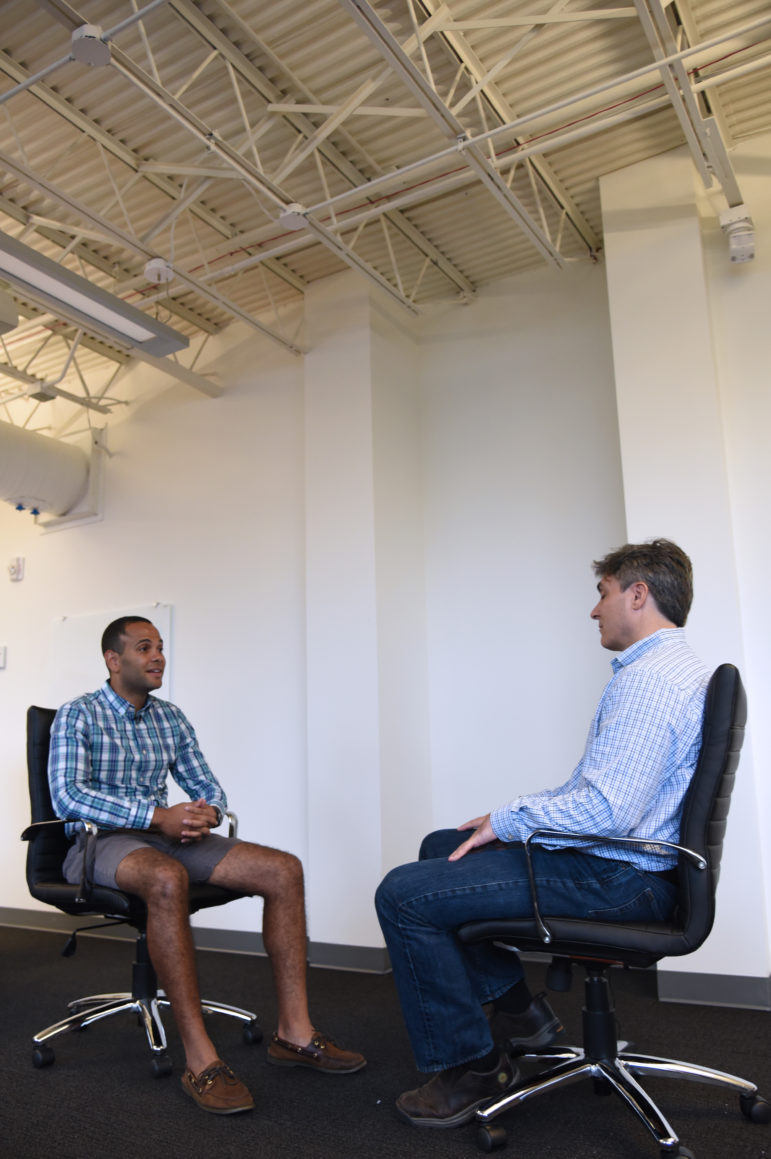 The thing that occurs to me as I think about this broader challenge is for you it’s fine. You’re a mature adult. You’ve got an undergraduate degree, a master’s degree. You’ve got a good job. You understand the world in a fairly sophisticated way and you’re able to make those calculations in the moment: ‘I may want to react this way but I’m not going to.’ For a 15-year-old kid who doesn’t have access to mentors like [the Big Brothers Big Sisters program] provides or other programs and doesn’t have any other role models to look up to — other than possibly gang-related role models — the same expectation is put on them to react with calm and composure in that type of situation, and when they don’t the repercussions can be rather dramatic. I empathize both with law enforcement because those situations can legitimately be dangerous, and I empathize and sympathize with the kids [who] are put into those situations who haven’t had the benefit of a lot of the [mentorship] that you’ve had over the years.
The thing that occurs to me as I think about this broader challenge is for you it’s fine. You’re a mature adult. You’ve got an undergraduate degree, a master’s degree. You’ve got a good job. You understand the world in a fairly sophisticated way and you’re able to make those calculations in the moment: ‘I may want to react this way but I’m not going to.’ For a 15-year-old kid who doesn’t have access to mentors like [the Big Brothers Big Sisters program] provides or other programs and doesn’t have any other role models to look up to — other than possibly gang-related role models — the same expectation is put on them to react with calm and composure in that type of situation, and when they don’t the repercussions can be rather dramatic. I empathize both with law enforcement because those situations can legitimately be dangerous, and I empathize and sympathize with the kids [who] are put into those situations who haven’t had the benefit of a lot of the [mentorship] that you’ve had over the years.
Gandy: … Growing up I was taught you’re not supposed to be open and warm. You’re supposed to be able to fend for yourself, protect yourself … You [wear] not a frown but a look, you walk with a certain swagger, you carry yourself confidently with strength. Actually, I was with my little brother last weekend and we took a picture. In the first picture we took together, I’m holding a racket [because] we were playing tennis; and I’m smiling, huge smile, teeth are showing, and my little brother is standing there [with] a straight face. We had a great time, and I know we had a lot of fun. That’s how he carries himself … I think the environment that these kids are being brought up in really magnifies the situation —
Scee: So you’re saying the defense mechanisms that you learn as a young child — 5, 6, 7, 8 years old — on how to behave, how to walk, how to talk, and how to face challenges … what many children learn growing up is not how you react to things today —
Gandy: Right ...
Scee: — It’s a difficult thing to affect that type of change because those kinds of skills may be very important for that type of survival or whatever type of situation they find themselves in as children.
Gandy: It reinforces itself, it becomes habit … and you do it without noticing it. That really creates an adversarial role between the person and the officer, which really adds fuel to the fire.
Scee: … I’m a father now of a 7-year-old boy, and being a father is a really big responsibility. I never felt like I took on that responsibility with [you]. I never considered myself to be a father figure, more of a brother [figure]. But you said something to me at one point that surprised me a little bit, you considered our relationship more like a father-son relationship than a brother relationship. I’d be interested to know what you meant by that.
Gandy: You were the person that knew it all. Whenever I was in some kind of situation where I needed to figure out what to do, you were the person I trusted to provide advice … I think it goes to the age difference … I’ve always [put you] on this pedestal. You’re that guy on top of the mountain that I could look up to.
Scee: I can assure you that is not what being a father is like. [laughing]
Gandy: [laughing] That’s fair … You were just the guy that was always there [who] always coached me. Not having had a father figure in my life from the day I was born … until I met you I didn’t think about [having a father] at all. I didn’t think I needed [a father], I didn’t want [a father]. I assumed I’d figure out on my own, but as I became older, I had more questions on how to get through life … Having you as a resource, I assumed that’s what having a father was for; [it was] the relationship I had formed in my head.
Scee: I think I felt that way about my father once I was about 25. Before that, I kind of listened to what he said but mostly I fought [him] …
Gandy: I think it’s the level of [comfort] as well … [You] weren’t there every day —
Scee: — You never got to see my flaws —
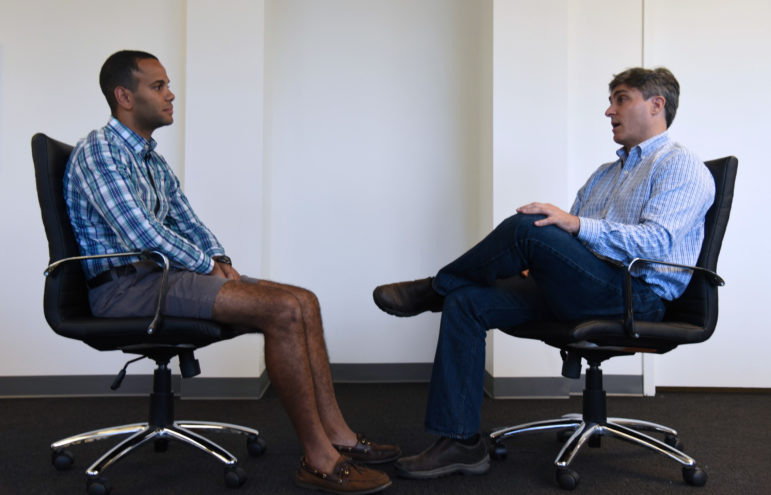
Gandy: … I was comfortable [enough] with you to open up and be vulnerable but not comfortable enough to fight back. I think it’s a different [type] of relationship … I think what we have is really special what we have; I don’t know how to describe it.
Scee: Well, whatever this is, it’s special to me. I’m curious to know: What would your message be to kids 15 to 20 years old — that seems to be the sweet spot for when things can really go wrong. What would be your message be to that group? ...
Gandy: I don’t think you can tell a 15-year-old a message and really have it impact them. I think to really change a 15-year-old, you have to do what we did: You have to expose them to new experiences, you have to take them out of their environment, take them to new restaurants or to Disney World … just expose them to all the things that the world [can offer], and as they gain these kind of experiences, I think they become more knowledgeable …
When I was 15, if you had just told me to do something, I don’t think it would have had much of an impact … If you had called me over the phone and said, ‘Mike, you need to do better in school.’ I think that would have been another conversation that I would never remember.
Scee: What would be your message for police? Police have to deal with very dangerous situations. Their number one job at the end of the day is to get home safe in one piece [and] to be with their family for the most part. What would be your message be to them?
Gandy: I think they have a really tough job, and a lot of times they are in life or death situations, and I couldn’t imagine that feeling of having to go through that day in and day out. At the same time, I think they should put more of an effort into [understanding] the people they pull over, the people that they question … [Police should] get to know [the neighborhoods they serve], to understand their culture, the way they speak, their music and understand what a day in the life is like for them.
… If they continue to see [the issue] as an ‘us versus them’ [situation], they [will] see younger black males as objects that they’re afraid of and intimidated by [and] not afraid to shoot … If they can build empathy toward them by getting to know them and understanding who they are and their culture, I think [building those relationships] would have a large impact and help de-escalate a lot of very intense situations. I would ask they spend this Saturday afternoon getting to know someone different from them …
Scee: … What would be your message to young black men who could potentially start to see those [at-risk individuals] as role models?
Gandy: … I think it has to be more of a community thing where people have to figure out ways to bring everyone up [and] to speak to these guys who are causing trouble ... Maybe the community should do a better job working with police officers. I think you have more of an impact by helping the community identify people who are causing problems so that the police can do their job better [as opposed to] having everyone identified by police as troublemakers. I think that could be really helpful.
Scee: And to do that, it gets back to integration of [positive police presence] into the neighborhoods … If the police and the communities can work together, maybe [there will be] a good result.
Gandy: I think that would be amazing … as [people] know each other [more], they [will] care about each other more. I see it being more beneficial to both sides …
This interview was edited for length and clarity.
Pingback: PowerUP receives coverage from national youth-focused magazine, YouthToday. – PowerUp Scholarship